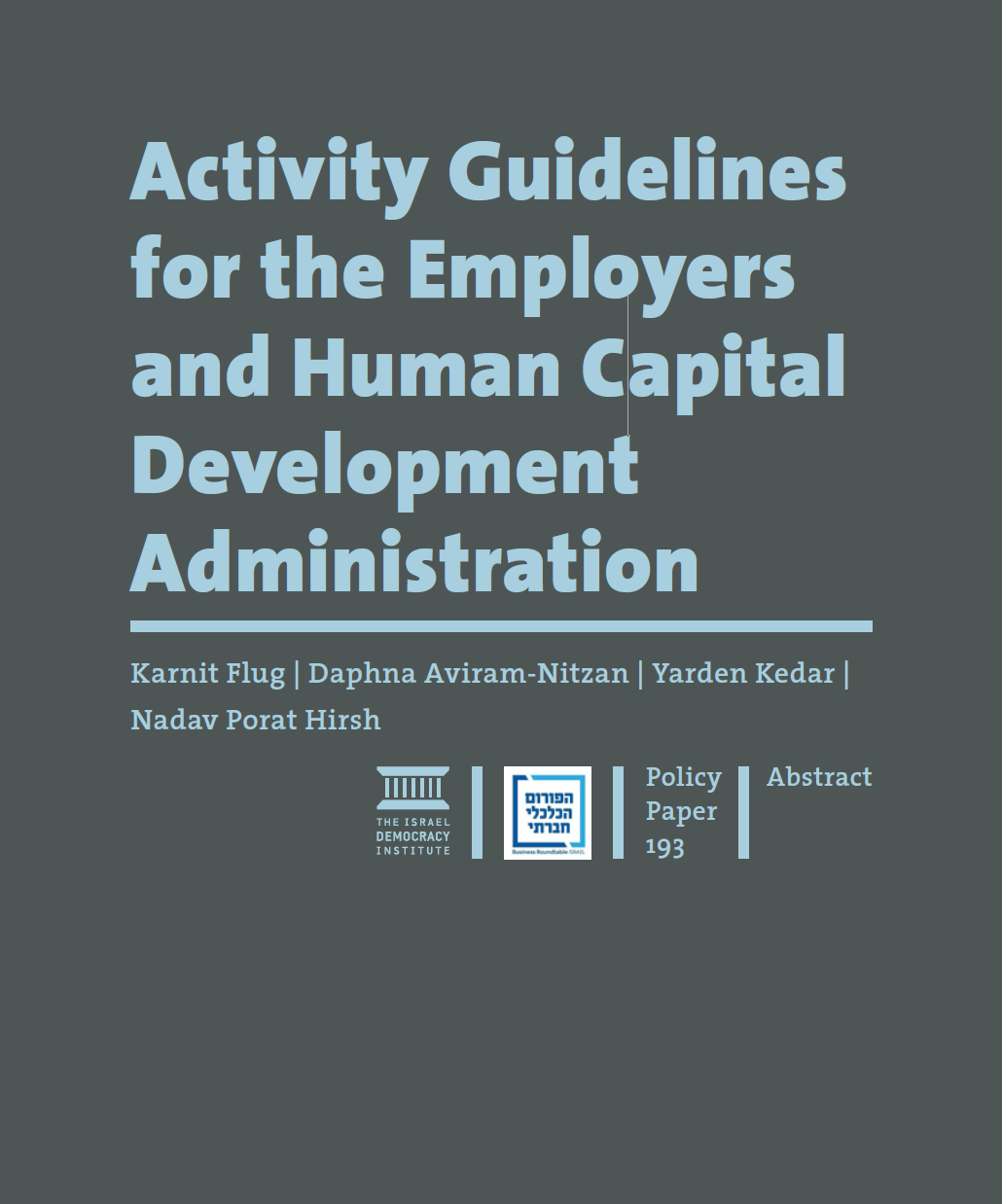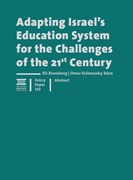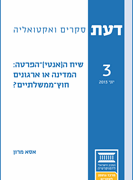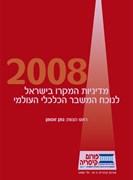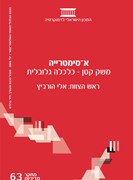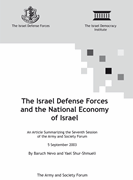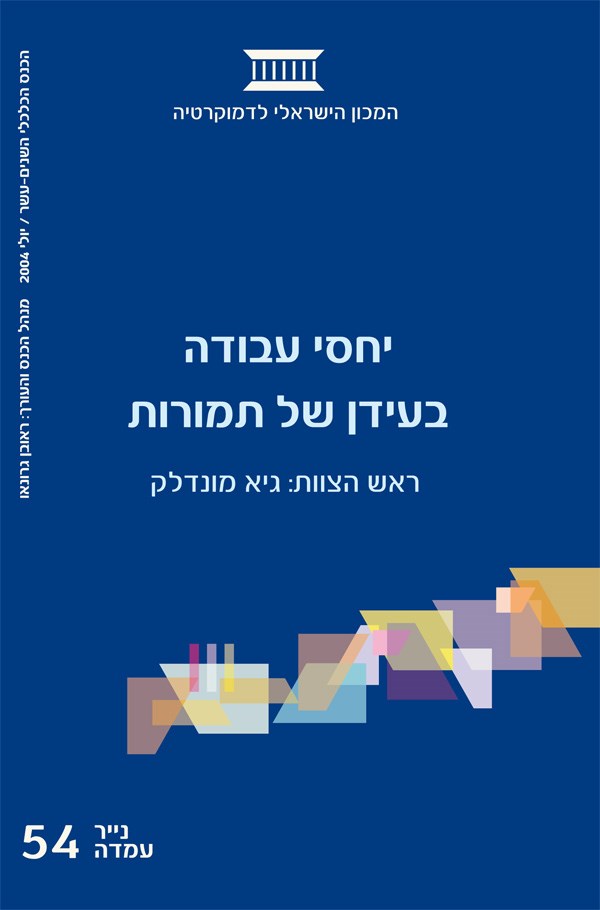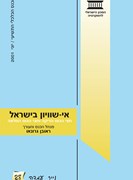

Publications Regarding economy
Articles

Israel Must Consider the Economic Consequences of Occupying Gaza
Written By: Prof. Karnit Flug, Prof. Jacob Frenkel

MKs Lapid; Gantz; Elkin; Lazimi: IDI’s Eli Hurvitz Conference Continues for its Second Day
Written By: The Israel Democracy Institute
Press Release | IDI Eli Hurvitz Conference 2025 | May 28

Innovation Meets Regulation: Israeli Tech Founders, Government Officials, and the Future of Civil Service, This Afternoon at IDI’s Eli Hurvitz Conference
Written By: The Israel Democracy Institute
Press Release | IDI Eli Hurvitz Conference 2025 | May 27, Afternoon Session

President Herzog; BOI Governor; MK Mansour Abbas; PMO’s Prof. Avi Simhon and Other Key Leaders Kick Off the Eli Hurvitz Conference
Written By: The Israel Democracy Institute
Press Release | IDI Eli Hurvitz Conference 2025 | May 27, Morning Sessions

In the Shadow of War: Aggregate Budget, Spending Priorities, and the Implications of an Increased Security Burden | Executive Summary
Written By: Prof. Karnit Flug, Roe Kenneth Portal
This study was released ahead of the Eli Hurvitz Conference on Economy and Society 2025.

Haredi Integration and Tax Payments – The Burden and the Potential | Executive Summary
Written By: Gabriel Gordon
This research was released ahead of the Israel Democracy Institute's annual Eli Hurvitz Conference on Economy and Society, 2025.

Survey of the Financial Situation of Workers During the Iron Swords War
Written By: Daphna Aviram-Nitzan, Omer Cohen
This survey is the second in series taken since the outbreak of the Iron Swords War assessing the financial impact of the war on the Israeli workforce.

The Proposed "Softened Rabbis Bill" Complicates the Budgeting Process for Religious Councils
Written By: Dr. Ariel Finkelstein
The recently proposed bill runs counter to accepted budgeting principles and undermines the autonomy of local governance.

Early Childhood Daycare Subsidies in Israel in Different Sectors
Written By: Gabriel Gordon,
A survey of daycare subsidies in Israel and recommendations for improved criteria that would encourage participation in the labor market among the ultra-Orthodox.

The Two Coalitions Israel Needs Now
Written By: Yohanan Plesner
It is increasingly clear that Israel’s future depends on the forging of two coalitions. One is a multinational alliance determined to turn the Palestinian issue from a driver of conflict into an engine of peace. The other, is an internal Israeli coalition ready to pursue a series of bold social, economic, and political reforms.

Workforce Participation of Haredi Yeshiva Students Under the Exemption Age
Written By: Gabriel Gordon
This study describes the employment trends among men registered in ultra-Orthodox yeshivas between the ages of 18-25. The findings are based on a reported work, or "legal work," so it is very likely that this is an underestimation of reality.

Employee Skills in Israel: Overview and Gap Analysis
Written By: Prof. Yotam Margalit, Zak Hirsch
Technological advancements, rapid globalization, and structural changes in the Israeli economy over the past few decades have led to significant shifts in the demand for workers and in the tasks required of them, as well as in the characteristics of their skills and qualifications. This study offers insights on these questions using a variety of data sources and by employing two distinct empirical approaches.

Financial Aggregates and New Budgetary Priorities for Israel
Written By: Prof. Karnit Flug, Tzachi David, Roe Kenneth Portal
In May 2023, the Knesset approved a two-year state budget for 2023–2024. However, following the outbreak of the war in Gaza and the accompanying conflict in the north, the budget's composition, safety cushions, and especially the priorities it reflects are no longer suited to Israel’s economic and geopolitical realities.

The Proposed “Reform” of the Judicial System Poses Risk to the Israeli Economy
Written By: Prof. Jacob Frenkel, Prof. Karnit Flug
Debilitating the judicial system would deal a blow to overseas investors’ motivation to invest in Israel and lead to a sharp drop in its credit rating. We need only look at the precedents of Turkey, Hungary, and Poland, to understand just how serious the threat is.

The UN Blacklist – A Devastating Blow, or Prelude to Future Dangers?
Written By: Prof. Yuval Shany
The UN Human Rights Council published a database of Israeli and international companies operating in the West Bank - what are the ramifications and possible outcomes?
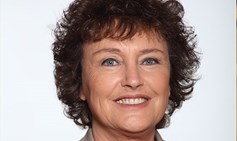
Karnit Flug Named William Davidson Fellow
The Israel Democracy Institute Names Former Bank of Israel Governor Karnit Flug William Davidson Fellow - new partnership will focus on ensuring Israel’s continued economic vitality.
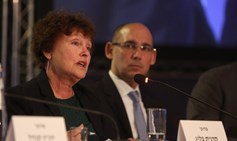
Ability to Make Economy Related Decisions Impaired
Prof. Karnit Flug, Vice President of IDI and Former Governor of the Bank of Israel spoke at the 2019 Eli Hurvitz Conference on Economy and Society: “With no government in place, the ability to make economy-related decisions is impaired. In the current situation, what is done depends entirely on what the Knesset Finance Committee is prepared to do."

Israel is in Danger of Becoming a Weakened State
Benny Gantz, Chair of the Blue and White party and former IDF Chief of Staff spoke at the 2019 Eli Hurvitz Conference: "Government ministers bicker daily with the professional echelon - a situation that harms Israelis"
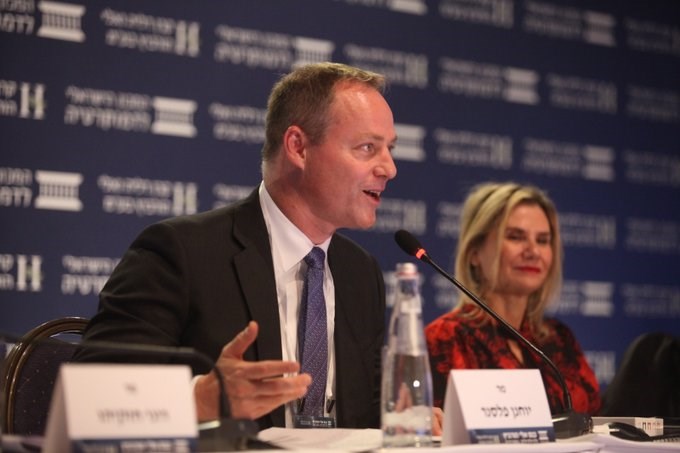
Israel’s Economy: Island of Stability with Troubling Trends
Yohanan Plesner, President of the Israel Democracy Institute and Prof. Eugene Kandel, CEO Start-Up Nation Central, open the two day conference, welcoming senior executives from the public and private sectors.

Economic Policy - Professional Independence and Long Term Planning
Excerpts from the presentation of Prof. Karnit Flug, IDI’s newly appointed Vice President, at the ‘Globes’ Governors Conference”

Israel Climbs Five Spots in the World Bank’s Ease of Doing Business Index
Israel improved by five spots over last year in the index of 190 countries. In first place is New Zealand, followed by Singapore, Denmark, Hong Kong, and South Korea. The Ease of Doing Business Index is an international indicator of how easy it is to do business in various countries.

Meet the Next Generation of IDI Leaders
Written By: Rachel Cohen, Adv. Alona Vinograd, Dr. Nasreen Haddad Haj-Yahya, Daphna Aviram-Nitzan, Dr. Gilad Malach
Guaranteeing an independent Supreme Court. Integrating the Ultra-Orthodox into the IDF. Boosting participation of Arab women in the workforce. Improving the ease of doing business in Israel. These are some of the challenges facing IDI’s new cadre of program and center directors.

Survey of Public Attitudes on Economic Policy (June 2018)
On the occasion of this year’s Eli Hurvitz Conference on Economy and Society (June 19-20) the Israel Democracy Institute published a special survey to assess public opinion on Israel’s economic future.
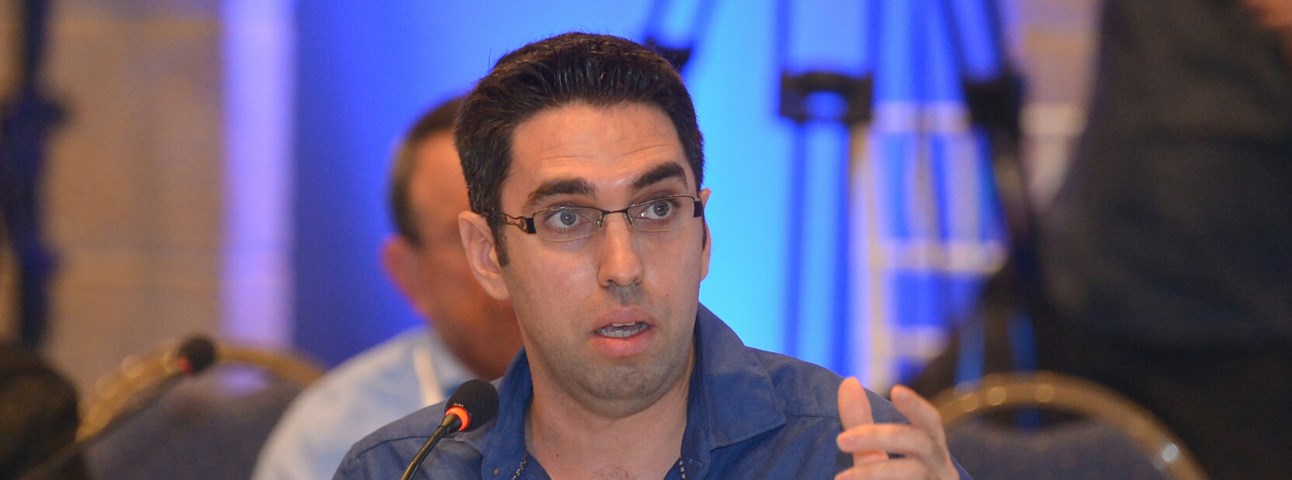
Israel needs a Paradigm Shift: Greater Compatibility Between Human Capital and the Economy
Written By:
Israel suffers from a shortage of skilled workers in manufacturing industries and hi-tech and an overflow of the service sector; priorities in the allocation of public resources for the training of human capital must be changed to better fit the needs of the economy.
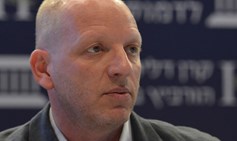
Israel’s future labor market needs updated models
Written By: Prof. Yotam Margalit
The number of vacation days in Israel is among the lowest in the world. Research by Prof. Yotam Margalit presents a new model which will ensure a minimum of 18 vacation days for each worker.

Two Economies - One Society: New Survey
Survey to serve as backdrop for discussion at Eli Hurvitz Conference on Economy and Society – June 19 and 20

Flexonomics
Written By: Ilan Evyatar
In a dynamic labor market, challenged by technological disruption and increasing longevity, flexibility is key.

Bank of Israel's Karnit Flug: 'Ensure More Ultra-Orthodox Males Receive a Complete Secular Education'
srael's GDP is 40 percent lower than that of the U.S. and its level of productivity is 33% less than most OECD countries, according to a presentation by Dr. Karnit Flug, governor of the Bank of Israel.

Israel Democracy Institute's First-Ever Economic Survey
As the Israel Democracy Institute's annual Eli Hurvitz Conference on Economy and Society kicks off today in Jerusalem, IDI's Guttman Center for Public Opinion and Policy Research sheds new light on Israeli socioeconomic discourse.

Bank of Israel Governor Karnit Flug, Ministry of Finance Director-General Shai Babad to Headline Eli Hurvitz Conference on Economy & Society
Israel Democracy Institute's leading economic conference will focus on integrating innovation into the government, actuarial crisis,
and role of business press, among other topics

The High Price of Ignoring Poverty
Written By: Dr. Sami Miaari
Following the publication of the Poverty Report, Dr. Sami Miaari points out the large percentage of Arab Israelis that live in poverty. He says the current situation requires a new strategy and economic investment on several levels simultaneously. This article first appeared on Times of Israel.

Before the Next Shock Hits
Written By: Avi Ben-Bassat
In this article, originally published in Haaretz on April 1, 2010, IDI Senior Researcher Prof. Avraham Ben-Bassat warns that Israel's policy of reducing taxes should be frozen since it may precipitate an economic crisis, and advocates giving preference to increasing public spending while preserving the economy's stability.

Active Labor Market Policy Must Become Priority
Written By: Prof. Yotam Margalit
For Israel's economy to grow, significant investment in building a strong and effective infrastructure for occupational training and reemployment is critical.

Eli Hurvitz Conference on Economy and Society
With the featured participation of: Bank of Israel Governor, Education Minister, Economy Minister, Director-General of the Finance Ministry, Director-General of the Prime Minister Office, Chairman of the Histadrut Labor Federation, Director-General of Bank Leumi, Director General of Microsoft Israel and other VIPs

How's It Going?
80% of Israelis are proud to be Israeli; 71% are optimistic about Israel’s future; and 38% see social gaps as a major challenge
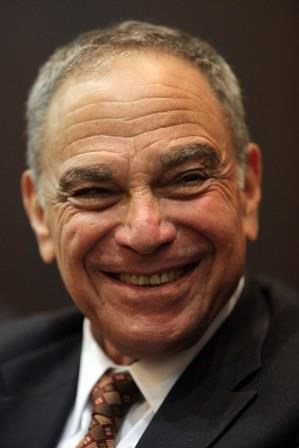
Professor Eytan Sheshinski joins the Israel Democracy Institute (IDI) as a Senior Researcher in the Center for Governance and the Economy
Top Israeli economist, Professor Eytan Sheshinski, has joined IDI as a senior researcher in the Center for Governance and the Economy, under the leadership of Dafna Aviram-Nitzan.

